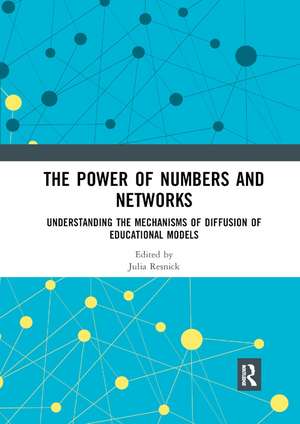The Power of Numbers and Networks: Understanding the Mechanisms of Diffusion of Educational Models
Editat de Julia Resniken Limba Engleză Paperback – 17 dec 2019
| Toate formatele și edițiile | Preț | Express |
|---|---|---|
| Paperback (1) | 258.09 lei 6-8 săpt. | |
| Taylor & Francis – 17 dec 2019 | 258.09 lei 6-8 săpt. | |
| Hardback (1) | 763.01 lei 6-8 săpt. | |
| Taylor & Francis – 18 dec 2017 | 763.01 lei 6-8 săpt. |
Preț: 258.09 lei
Preț vechi: 310.43 lei
-17% Nou
Puncte Express: 387
Preț estimativ în valută:
49.40€ • 51.35$ • 40.92£
49.40€ • 51.35$ • 40.92£
Carte tipărită la comandă
Livrare economică 05-19 februarie 25
Preluare comenzi: 021 569.72.76
Specificații
ISBN-13: 9780367892487
ISBN-10: 0367892480
Pagini: 192
Dimensiuni: 174 x 246 x 18 mm
Greutate: 0.36 kg
Ediția:1
Editura: Taylor & Francis
Colecția Routledge
Locul publicării:Oxford, United Kingdom
ISBN-10: 0367892480
Pagini: 192
Dimensiuni: 174 x 246 x 18 mm
Greutate: 0.36 kg
Ediția:1
Editura: Taylor & Francis
Colecția Routledge
Locul publicării:Oxford, United Kingdom
Public țintă
Postgraduate, Professional, and UndergraduateCuprins
Introduction. The power of numbers and networks: understanding the mechanisms of diffusion of educational models 1. Standards are good (for) business: standardised comparison and the private sector in education 2. The power of numbers: the adoption and consequences of national low-stakes standardised tests in Israel 3. Global polity in adult education and UNESCO: landmarking, brokering and framing policy 4. Awareness-raising, legitimation or backlash? Effects of the UN Convention on the Rights of Persons with Disabilities on education systems in Germany 5. Interpreting the circulation of educational discourse across space: searching for new vocabularies 6. Global argonauts: returnees and diaspora as sources of innovation in China and Israel 7. The development of the International Baccalaureate in Spanish speaking countries: a global comparative approach
Notă biografică
Julia Resnik is a Senior Lecturer at the School of Education in the Hebrew University of Jerusalem, Israel. Her main research areas are globalisation of education policies, comparative education, multiculturalism, migrant children (migrant workers and asylum seekers), international education and the involvement of civil society in education systems. She has edited various special issues and published many articles in peer-reviewed Anglophone and francophone journals.
Descriere
Contributors to this volume have developed methodological perspectives to study the circulation of educational models worldwide in order to make sense of the complexity of education policies today. It was originally published as a special issue of Globalisation, Societies and Education.
